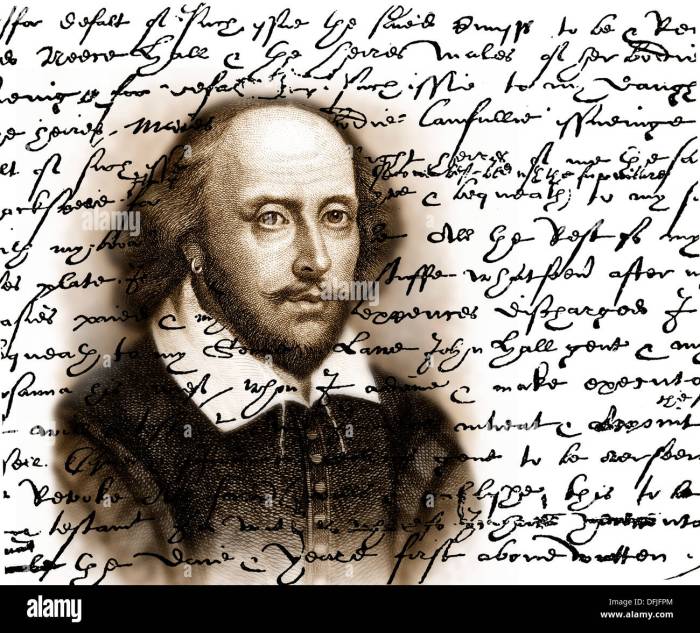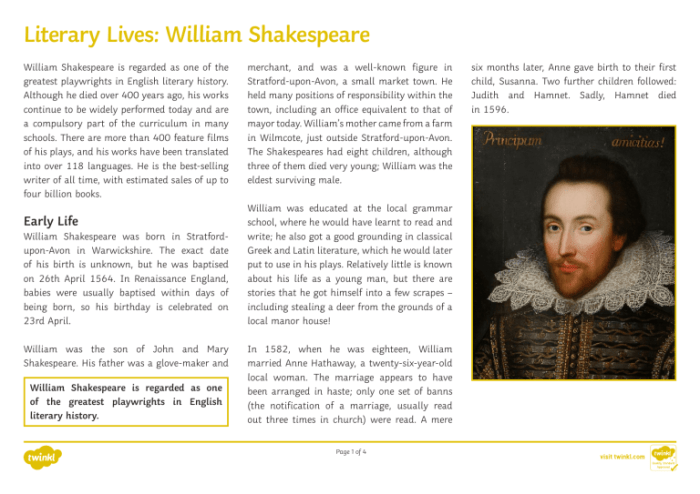What does this passage reveal about william shakespeare the playwright – Exploring the depths of William Shakespeare’s artistry, this examination unveils the playwright’s profound insights into human nature, mastery of language, and enduring influence on literature and theater.
Through an analysis of his unparalleled use of language, characterization, themes, and influence, we embark on a journey to uncover the genius behind one of the greatest literary figures of all time.
Shakespeare’s Language and Style

Shakespeare’s mastery of the English language is evident in his unique vocabulary, imagery, and syntax. His plays contain over 20,000 words, many of which he coined himself. He also employed a wide range of metaphors, similes, and personifications, creating vivid and memorable images in the minds of his audience.
Vocabulary
- Shakespeare introduced new words and phrases into the English language, such as “assassinate,” “bedazzled,” and “swagger.”
- He also used words in unconventional ways, such as “to sleep” as a noun (“my dearest sleep”) and “to strange” as a verb (“to strange my eyes with fasting”).
Imagery, What does this passage reveal about william shakespeare the playwright
- Shakespeare’s use of imagery is particularly striking. He created vivid and evocative images through his use of metaphors, similes, and personifications.
- For example, in “Romeo and Juliet,” he compares Juliet’s beauty to the sun: “But soft! What light through yonder window breaks? / It is the east, and Juliet is the sun.”
Syntax
- Shakespeare’s syntax is often complex and unconventional, reflecting the spoken language of his time.
- He frequently used inversions, ellipsis, and double negatives, which can make his plays challenging to read but also contribute to their unique and memorable style.
Shakespeare’s Characterization
Shakespeare’s characters are among the most memorable and complex in literature. He created a wide range of characters, from tragic heroes and heroines to comic fools and villains. His characters are often driven by conflicting emotions and motivations, making them both relatable and fascinating.
Depth and Complexity
- Shakespeare’s characters are not simply one-dimensional stereotypes. They are complex and multifaceted, with both strengths and weaknesses.
- For example, Hamlet is a brilliant and introspective prince, but he is also indecisive and prone to self-pity.
Motivations and Flaws
- Shakespeare’s characters are motivated by a variety of complex and often conflicting emotions.
- They are often driven by ambition, love, jealousy, and revenge.
- Their flaws often lead them to make tragic mistakes, which ultimately result in their downfall.
Relationships
- Shakespeare’s plays explore the complex relationships between characters.
- He often uses relationships to explore themes such as love, loyalty, and betrayal.
- For example, the relationship between Romeo and Juliet is a classic example of a passionate but ultimately tragic love.
Shakespeare’s Themes and Ideas: What Does This Passage Reveal About William Shakespeare The Playwright

Shakespeare’s plays explore a wide range of themes and ideas, including love, death, ambition, and the nature of good and evil. He often used his plays to comment on the human condition and the social and political issues of his time.
Love
- Love is one of the most common themes in Shakespeare’s plays.
- He explored the different aspects of love, from passionate romance to courtly love to platonic friendship.
- Some of his most famous love stories include “Romeo and Juliet,” “Antony and Cleopatra,” and “A Midsummer Night’s Dream.”
Death
- Death is another major theme in Shakespeare’s plays.
- He explored the different ways that people die, from natural causes to murder to suicide.
- Death often serves as a catalyst for change in Shakespeare’s plays, as it forces characters to confront their own mortality and the meaning of life.
Ambition
- Ambition is another common theme in Shakespeare’s plays.
- He explored the different ways that people pursue their ambitions, from noble to ignoble.
- Ambition often leads to tragic consequences in Shakespeare’s plays, as characters overreach and ultimately destroy themselves.
Shakespeare’s Influence on English Literature and Theater

Shakespeare’s work has had a profound influence on English literature and theater. He is considered one of the greatest writers in the English language, and his plays continue to be performed and studied around the world.
Language
- Shakespeare’s plays have had a major impact on the English language.
- He introduced new words and phrases into the language, and his use of language has influenced the way that people write and speak English.
- For example, many of the idioms and phrases that we use today can be traced back to Shakespeare’s plays.
Storytelling Techniques
- Shakespeare’s plays have also had a major impact on storytelling techniques.
- He developed new ways to tell stories, such as the use of subplots and soliloquies.
- His plays have also influenced the way that filmmakers and television writers tell stories.
Theatrical Conventions
- Shakespeare’s plays have also had a major impact on theatrical conventions.
- He developed new ways to stage plays, such as the use of multiple settings and the use of music and dance.
- His plays have also influenced the way that theaters are designed and built.
Question Bank
What is Shakespeare’s most famous play?
Hamlet
What is Shakespeare’s most famous sonnet?
Sonnet 18
What is Shakespeare’s most famous quote?
“To be or not to be, that is the question.”